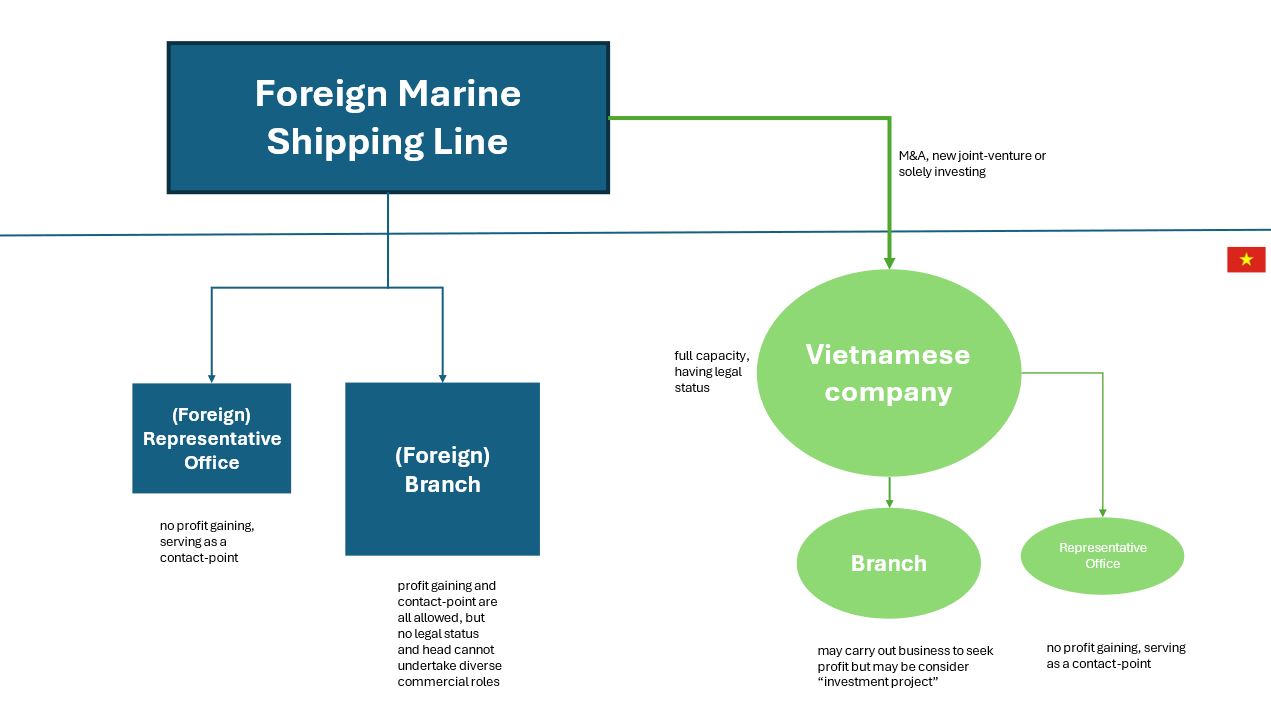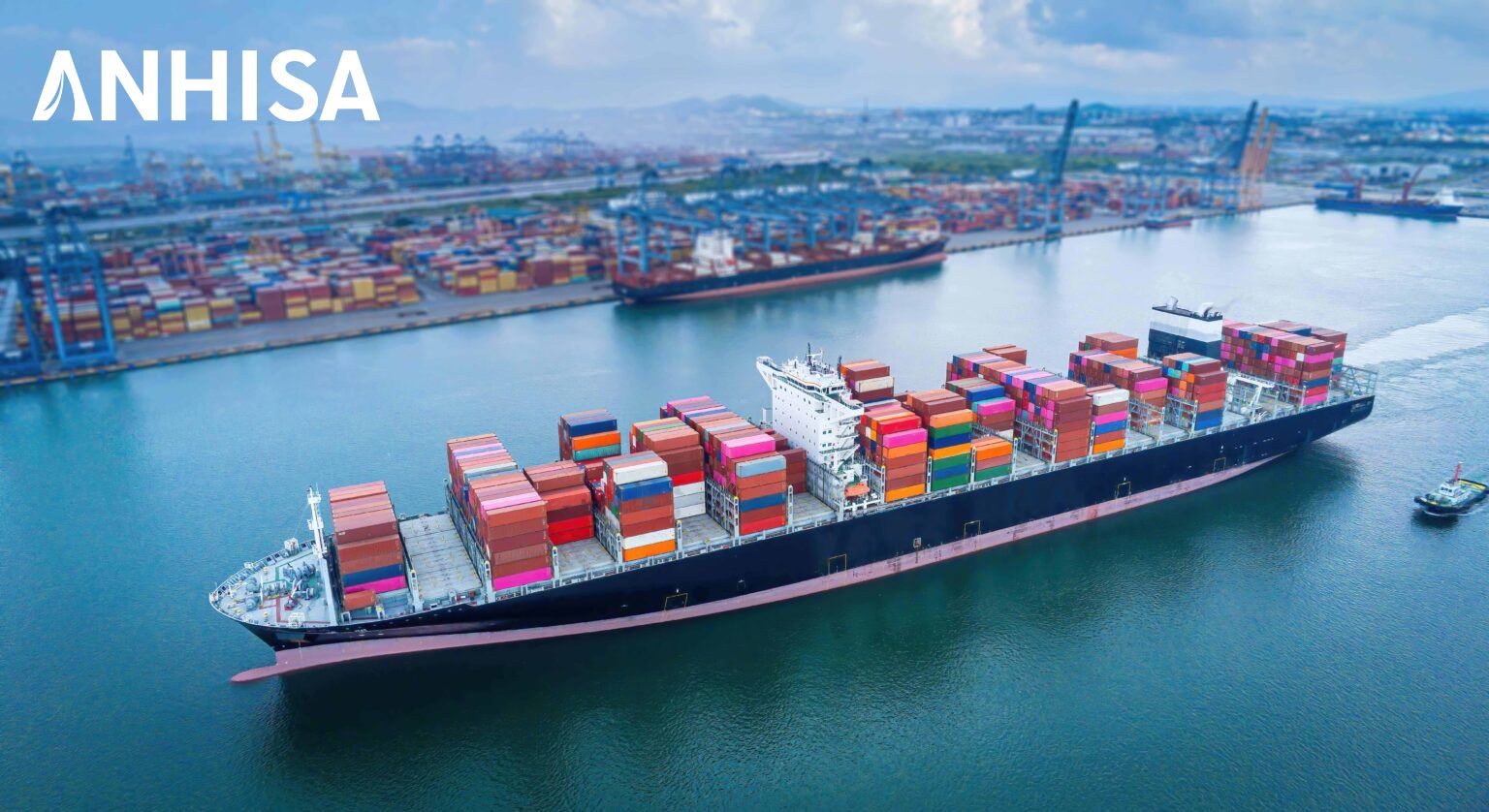Establishing a Commercial Presence in Vietnam: What Foreign Marine Shipping Lines Need To Know
May 29, 2025
Vietnam presents a lucrative market for foreign shipping lines, offering opportunities to exploit freight routes to numerous countries and continents worldwide. The potential for foreign shipping lines to serve exporters and importers in Vietnam is substantial. We frequently receive inquiries from shipping lines about establishing a commercial presence in Vietnam, whether they are planning to expand their business scope or simply set up contact points in economically developed provinces and cities with vibrant seaport activities, such as Hanoi, Hai Phong, Quang Ninh, Da Nang, Vung Tau, and especially Ho Chi Minh City, etc.
Based on our experience, a foreign shipping company can penetrate the Vietnamese market through several avenues:

1 – (Foreign) Representative Office
This office operates as a liaison point without any business or service provision functions.
Pros: Appointed by the parent company abroad, they establish relationships with parties, markets, and state agencies, and promote trade to advocate for the parent company’s business. This model is quite simple and appropriate for those seeking to increase recognition.
Cons: The representative office’s operational scope is limited; they are not permitted to buy and sell goods and services for direct profit in Vietnam, and the head of the office faces numerous restrictions on undertaking other commercial positions, such as being other branches/Vietnamese companies’ heads.
2 – (Foreign) Branch
This entity has business functions authorized by the headquarters and in accordance with its granted license for establishment and operation.
Pros: Branches of foreign shipping lines provide services, earn profits, repatriate, pay taxes, and generally have more extensive operations than representative offices.
Cons: Such Branches do not possess their legal status and will be considered as responsibility-dependent on the parent company abroad. The reporting regime applicable to this type of presence is relatively complex, and the Branch Head also subject to certain limitations similar to those of the above-mentioned representative offices’ heads.

3 – Investment through a Vietnamese Company
Vietnam is a relatively open market for foreign investors in the fields of coastal and ocean transport, warehousing, and logistics, with several international investment commitments. At this point, foreign shipping lines may navigate the business in the form of investment through establishing a Vietnam-domiciled company according to the Vietnam Enterprise Law. The three protocols of investment should be enumerated as M&A into an existing company, participating in a joint venture as a multi-member LLC, or solely establishing a single-member LLC.
- M&A
Foreign shipping lines can acquire shares or make capital contributions to an existing enterprise in Vietnam. This ensures that the business has a base to operate, but due diligence is crucial to avoid risks associated with previously incurred obligations.
- Joint venture toward a multi-member company (LLC or JSC)
A new business in the form of a joint venture is also a viable option, as local partners can assist with capital, location, market, and relationships with state agencies, but corporate governance will require an adequate resource.

- A single-member limited liability company
Shipping companies can also enter Vietnam’s shipping market by establishing a new limited liability company under their own ownership.
- Expanding the arms with local branches and representatives
Existing businesses in Vietnam can open new representative offices and branches anywhere, provided that they have adhered to the required application. Since these companies are now domiciled in Vietnam, establishing local representative offices and branches is somewhat simpler than the first two options, but please be aware that branches established for profit-seeking business may be considered an investment project and subject to a separate application.
4 – Appointing Vietnamese local agent(s)
Lastly, when not directly present in Vietnam, we have observed shipping lines that appoint their agents in Vietnam as 100% local businesses. These agents represent shipping lines to enter into contracts and liaise with consignees and shippers, Ports, Customs, Tax Agencies, and others. Such a contractual relationship allows the shipping lines to mitigate relevant costs but may generate the risk of ineffective controllability.
ANHISA LLC AND OUR EXPERTISE
ANHISA LLC is a boutique law firm specializing in Dispute Resolution, Shipping and Aviation. Being the leading lawyers in various fields of law, our qualified, experienced, and supportive team of lawyers know how to best proceed with a case against or in relation to Vietnamese parties and are well equipped to provide clients with cost-effective and innovative solutions to their problems.
Regarding dispute resolution, we have represented Vietnamese and foreign clients in the resolution of disputes involving maritime, construction, commercial and civil matters. Our lawyers are well-equipped to offer services on a wide range of disputes and conflicts, whether cross-border or purely domestic, to appear before any Judges or Arbitral Tribunals. The firm is prepared to assist clients in designing the appropriate dispute resolution procedure to help resolve conflicts as efficiently and cost effectively as possible, which may involve combining elements of mediation and other methods such as arbitration.
AUTHORS
DANG VIET ANH
Managing Partner
Mobile: (+84) 983 467070
Email: anh@anhisa.com
NGUYEN THI TUYET MAI
Senior Associate
Mobile: (+84) 939 117398
Email: mai@anhisa.com
TRAN DUC MANH
Associate
Mobile: (+84) 337 649204
Email: manh@anhisa.com
This article aims to furnish our clients and contacts with general information on the relevant topic for reference purposes only, without creating any duty of care on the part of ANHISA. The information presented herein is not intended to serve, nor should it be considered, as a substitute for legal or other professional advice.
Related posts

VIETNAM – SHIPPING LAW PRACTICE: MARITIME ADMINISTRATION’S INVESTIGATIONS IN VESSEL COLLISIONS
August 06, 2025

SHIPWRECK: RESOLUTION FOR INVOLVED DISPUTES
July 23, 2025
- EMAIL:
- om@anhisa.com
- office@anhisa.com
- TEL:
- Hanoi Office: +84 24 320 47609
- Saigon Office: +84 28 5416 5873
- HOTLINE:
- +84 (0) 939 117 398
- +84 (0) 983 488 380



